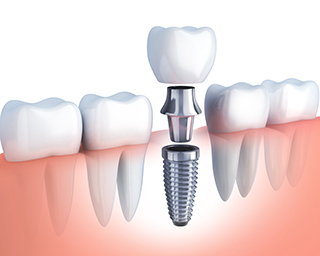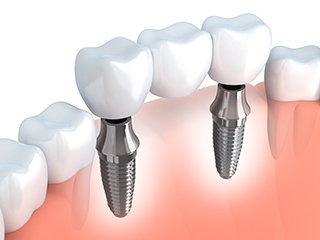 If you have recently dealt with an injury or disease that affected your oral health, there are options available to recover the smile you once had. You may even be able to achieve a better smile than the one you had. Dental implants make it possible to renew your smile if you have lost some teeth. There are several options when it comes to dental implants, depending on how many teeth need to be replaced: just one tooth or several teeth in a row.
If you have recently dealt with an injury or disease that affected your oral health, there are options available to recover the smile you once had. You may even be able to achieve a better smile than the one you had. Dental implants make it possible to renew your smile if you have lost some teeth. There are several options when it comes to dental implants, depending on how many teeth need to be replaced: just one tooth or several teeth in a row.
How do dental implants work?
A dental implant is a metal post, usually made of titanium, which replaces the root portion of a missing tooth. Your dentist will then place a replacement tooth to the post, which can be permanently attached or removable. Permanent replacement teeth are more stable and feel more like natural teeth.
An idea candidate for dental implants:
- Is a non-smoker
- Has maintained good oral health
- Has healthy gums with no signs of gum disease
Single or Multiple Dental Implants
 Dental implants are very versatile. If you’re missing one tooth, one implant and one replacement tooth will take care of your problem. If you’re missing several teeth in a row, a few strategically placed implants can support a permanent bridge. Similarly, if you have lost all of your teeth, a full bridge or full denture can be permanently fixed in your mouth with a strategic number of implants.
Dental implants are very versatile. If you’re missing one tooth, one implant and one replacement tooth will take care of your problem. If you’re missing several teeth in a row, a few strategically placed implants can support a permanent bridge. Similarly, if you have lost all of your teeth, a full bridge or full denture can be permanently fixed in your mouth with a strategic number of implants.
Dental Implants vs. Dentures and Bridges
Unlike dental implants, bridges and dentures are not fixed to the bone. This can result in them being unstable, making it difficult to eat or smile with the confidence you want. Dental implants look, feel, and act more natural, just like your natural teeth. They also have a stronger biting force. Implants do not rely on neighboring teeth for support, which is definitely an advantage since this means they won’t compromise the health of your surrounding healthy teeth. Implants are also likely to last a lifetime, whereas bridges are only expected to last seven to ten years and even less if a root canal is required.
Taking Care of Your Dental Implants
Your new dental implants should be treated just like natural teeth. They require brushing and flossing at least twice every day and regular checkups and cleanings with your dentist. The better you take care of your implants, the more likely they truly will last you a lifetime.












